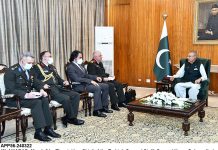KARACHI: The health profile of Pakistan is still poor, and the government and private sector need to pay a great deal of attention to improve the overall quality of health facilities for the public, according to a Pakistan Social and Living Standard Measurement (PSLM) survey.
According to the Pakistan Bureau of Statistics (PBS) survey for the period of 2014-15, the overall mortality reduction of infants and children has been slow in the country. Awareness regarding nutritional needs, and pre and post-natal care of mothers is also disappointing. The survey found the poor people of the country have little knowledge of diseases and illnesses, and can ill-afford expensive treatments.
Immunisation rates in Pakistan increased very minutely, from 57% to 60%. This was not good enough, especially because it is the most successful and cost-effective health intervention, having eradicated smallpox and polio from most of the world. The immunisation rates in urban areas have increased to 70% in 2014-15 as compared to 66% in 2012-13. In rural areas 56% of the population was immunised in 2014-15 as compared to 54% in 2012-13, PBS revealed.
Punjab has the highest percentage of children who are fully immunised, with 70% in 2014-15, as compared to 65% in 2012-13. This is followed by Khyber Pakhtunkhuva (KP) with 58% in 2014-15 as compared to 53% in 2012-13, Sindh (45% in 2014-15 as compared to 42% in 2012 13) and finally Balochistan, which has slightly declined to 27% in 2014-15 as compared to 29% in 2012-13.
Maternal health is serious issue in developing countries like Pakistan. To reduce the maternal mortality, the survey recommended providing quality pre-natal care, which encourages women to learn the symptoms of pregnancy and delivery, to be immunised against tetanus and to be educated about infant care.
In Pakistan, 73 % of mothers who had given birth in the last three years went for pre-natal consultations during their last pregnancy in 2014-15 as compared to 69% in 2012-13. Pre-natal consultations have increased in urban as well as in rural areas; however they are higher in urban areas with 86 percent as compared to 67 percent in rural areas.
Punjab has the highest consultation rate with 78% in 2014-15 as compared to 73% in 2012-13 and Balochistan has the lowest with 47% in 2014-15 as compared to 50% in 2012-13. In Islamabad, 95% women went for pre-natal consultation. While observing the district level position, Rawalpindi with 95%, Karachi with 96%, Haripur with 85%, Lasbela with 79% are the top ranked districts within their respective provinces.
متعلقہ مضامین
-
PIA privatisation plan approved by newly formed board
-
Azma blasts PTI for boycotting national security briefing
-
KP govt asked not to give electricity profit, tobacco cess to universities
-
Gen Sharif discusses RAWs involvement in Pakistan with Rouhani
-
Finance Ministry denies Dar’s meeting with Panama deputy minister
-
House fire kills six, injures three in Muzaffargarh
-
Punjab performed best, while Balochistan deteriorated
-
Maria murder case: Police arrests central suspect Master Shaukat
-
MoU signed between NEF, AJK schools
-
Interior minister leaves on three-day visit to UK
-
Raheel Sharif says PM Modi aware of Pakistans military capabilities
-
گولڈ بلٹز آفیشل گیم ڈاؤن لوڈ کرنے کا مکمل طریقہ











